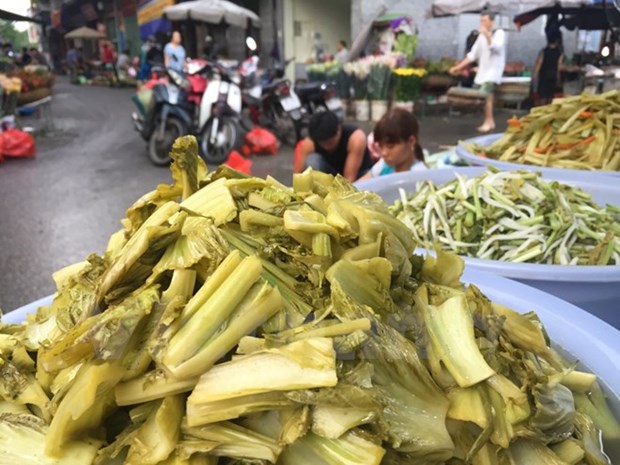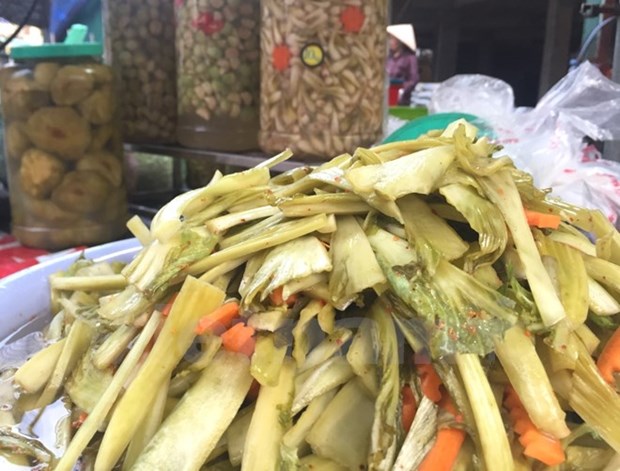Indeed,
such traditional products are encroached by imported brands from other
countries.
A
question is raised that if Korea is well known with their kimchi, where is
Vietnamese pickles on the map of culinary world? What would our local firms and
our food artisans react when our traditional food have lost a goal on our home
ground?
Art.1: Eggplants,
leek pickles, and fermented bean paste – are they fading away?
Summer
in the North of Vietnam is harsh. Sunlight directly burns the streets up and
the air is muggy. People tend to be dehydrated and tired. To cheer up the
meals, there are always sour soup and pickled eggplants to increase the taste.
When
winter comes, the air is chill and dried. It will be great if a meal has
roasted fatty pork and pickled mustard served with fresh cooked rice.
During
Tet holiday, Vietnamese must have bánh chưng, bánh tét (traditional sweet rice
cake), which are made from good sweet rice and filled with green beans and pork
belly. To lighten this type of “heavy” food, picked Chinese onions are a great
choice. Peeled onions are fermented in salty water until their sharp and
pungent flavor partially fading and an onion carries all salty, spicy, hot, and
sour flavors. Such a great side dish for bánh chưng.
“Silent beauty”
Pickles
produce is special side dishes that have run from generation to generation in
traditional daily meals of Vietnamese. They are also improvised to become more
diverse and abundant.

Pickled produce – folk side dishes running from generation to generation in Viet Nam.
Original
or traditional-like dishes always have their places in daily meals. They have
their own silent beauty, which can please from the king to the beggar.
Ha
Minh Quan, a 30-year-old engineer who used to study abroad then he got married
and settled in New Zealand, shared his honest feelings, “Once I used FaceTime
to talk to my parents in Vietnam and I saw a delicious pickled mustard dish in
the middle of the slaver. And I was suddenly mouthwatering. And I felt a hint
of aroma; a sour and pungent taste poked at my nose. Sometimes I just long for a
real pickled eggplant but there is just sweet and sour white eggplant here. No,
that’s not enough.”
However,
those side dishes are quite picky. Cuisine is an art; you can’t just force a
rural pickle to date classy dishes and expect a happy ending.
Minh
Nhat, Master Chef Viet Nam 2014, has amazingly succeeded in his business
because he knows how to lead folk cuisine to meet modern values to create
special taste for his food.
He
opened a chain of bread stores and started to build up his brand. Chef Minh Nhat
shared a tip to “raise” his customers, which is tiny but as important as other
main ingredients: chili sauce.
“A
good bread can’t be completed without chili sauce. And if that chili sauce is
special enough, it should stay in long-term-memory area and be coded. Later, if
the nose just catches this typical smell of the chili sauce, the brain will
decode and shape other flavors as spicy, aroma, and tasty. The brain also
stimulates the taste to recall all special ingredients in the bread”, analyzed
Minh Nhat.
No pain no gain
Once
the path was shaped, chef Minh Nhat had started to focus on the bold point of
his bread - chili sauce – while maintaining the quality of other ingredients.
His chili sauce is all home made with a constant recipe.
“In
the north of Viet Nam, there are so many types of chili with different spicy
levels, smell, and flavors. To create my own chili sauce, I combine the scent
and red color of sweet chili with spicy bird chili with a certain ratio.
However, because it’s home made without any preservatives so it’s easy to get
spoiled. Have to keep it in cool temperature and use it within short time”,
said chef Minh Nhat.
People
from the 1960’s or 1970’s must remember their subsidy period, when their spare
meals always had had pickled eggplant or pickled mustard but nowadays, those
frugal dishes have been losing their original taste.

Sweet and sour mustard pickle, a recent tasty trendy dish.
Ms.
Le Thi Nga, about 50 years old, owns a well-known kiosk of pickled produce in
Long Bien district (Ha Noi Capital). With her 20 years experiences, she sells
around 100kgs per day and her customers are almost frequent and local citizens.
According
to Ms. Nga, fine pickled eggplant should have yellowish color, little withered,
little chewy yet crunchy, salty, and sour enough while pickled mustard should
be bright yellow, aromatic, crunchy, sour and salty to taste.
“My
customers have complained that pickled stuff is not as good as the one they had
years ago. It’s true. Because people have used too many fertilizers and
chemicals on their plants, the fruits or leaves are obviously affected”,
honestly said Ms. Nga.
With
wholesalers, Ms. Nga directly bought whole crop from farmers so that she could
ask them to her produce clean in certain time after fertilizing. Usually, she
waited until the worms coming out then harvested the whole crop. Therefore, her
pickled products are always nice looking and aromatic.
“Pickling
is easy but to make sure that pickled produce stay good and tasty in different
picky weathers of the north is not simple. Eggplant must be washed and drained
and mustard leaves must be in good condition before pickling. Otherwise, final
products will be spoiled. Even though we make mass amount of pickled products
but I always wash produce myself”, said Ms. Nga.
By Vietnam+